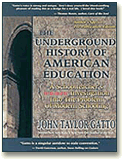 |
Prologue
The shocking possibility that dumb people don’t exist in sufficient numbers to warrant the millions of careers devoted to tending them will seem incredible to you. Yet that is my central proposition: the mass dumbness which justifies official schooling first had to be dreamed of; it isn’t real. |
| PART ONE Of Schooling, Education, And Myself |
|
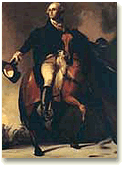
| Chapter One The Way It Used To Be Our official assumptions about the nature of modern childhood are dead wrong. Children allowed to take responsibility and given a serious part in the larger world are always superior to those merely permitted to play and be passive. At the age of twelve, Admiral Farragut got his first command. I was in fifth grade when I learned of this. Had Farragut gone to my school he would have been in seventh.
|

| Chapter Two An Angry Look At Modern Schooling The secret of American schooling is that it doesn’t teach the way children learn and it isn’t supposed to. It took seven years of reading and reflection to finally figure out that mass schooling of the young by force was a creation of the four great coal powers of the nineteenth century. Nearly one hundred years later, on April 11, 1933, Max Mason, president of the Rockefeller Foundation, announced to insiders that a comprehensive national program was underway to allow, in Mason’s words, “the control of human behavior.” |
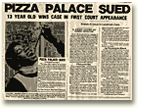
| Chapter Three Eyeless In Gaza Something strange has been going on in government schools, especially where the matter of reading is concerned. Abundant data exist to show that by 1840 the incidence of complex literacy in the United States was between 93 and 100 percent, wherever such a thing mattered. Yet compulsory schooling existed nowhere. Between the two world wars, schoolmen seem to have been assigned the task of terminating our universal reading proficiency.
|
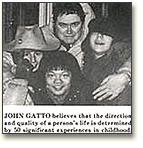
| Chapter Four I Quit, I Think I lived through the great transformation which turned schools from often useful places into laboratories of state experimentation with the lives of children, a form of pornography masquerading as pedagogical science. All theories of child-rearing talk in averages, but the evidence of your own eyes and ears tells you that average men and women don’t really exist except as a statistical conceit. |
| PART TWO The Foundations Of Schooling |
|
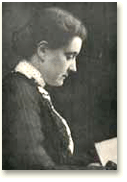
| Chapter Five True Believers And The Unspeakable Chautauqua From start to finish, school as we know it is a tale of true believers and how they took the children to a land far away. All of us have a tiny element of true believer in our makeups. You have only to reflect on some of your own wild inner urges and the lunatic gleam that comes into your own eyes on those occasions to begin to understand what might happen if those impulses were made a permanent condition.
|

| Chapter Six The Lure Of Utopia Presumably humane utopian interventions like compulsion schooling aren’t always the blessing they appear to be. For instance, Sir Humphrey Davy’s safety lamp saved thousands of coalminers from gruesome death, but it wasted many more lives than it rescued. That lamp alone allowed the coal industry to grow rapidly, exposing miners to mortal danger for which there is no protection. What Davy did for coal producers, forced schooling has done for the corporate economy.
|
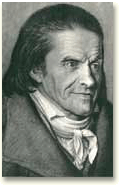
| Chapter Seven The Prussian Connection In 1935, at the University of Chicago’s experimental school where John Dewey had once held sway, Howard C. Hill, head of the social science department, published an inspirational textbook called The Life and Work of the Citizen. The title page clearly shows four cartoon hands symbolizing law, order, science, and the trades interlocked to form a perfect swastika. By 1935, Prussian pattern and Prussian goals had embedded themselves so deeply into the vitals of institutional schooling that hardly a soul noticed the traditional purposes of the enterprise were being abandoned. |
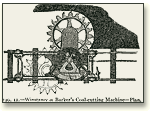
| Chapter Eight A Coal-Fired Dream World A dramatic shift to mass production and mass schooling occurred in the same heady rush. Mass production could not be rationalized unless the population accepted massification. In a democratic republic, school was the only reliable long-range instrument available to accomplish this. Older American forms of schooling would not have been equal to the responsibility which coal, steam, steel, and machinery laid upon the national leadership. Coal demanded the schools we have and so we got them—as an ultimate act of rationality.
|
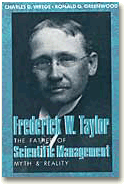
| Chapter Nine The Cult Of Scientific Management “In the past,” Frederick Taylor wrote, “Man has been first. In the future, System must be first.” The thought processes of the standardized worker had to be standardized, too, in order to render him a dependable consumer. Scientific management spread rapidly from the factory into the schools to seek this goal.
|
| PART THREE A Personal Interlude |
|
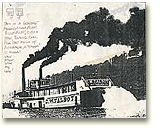
| Chapter Ten My Green River The great destructive myth of the twentieth century was the aggressive contention that a child could not grow up correctly in the unique circumstances of his own family. Forced schooling was the principal agency broadcasting this attitude. |
| PART FOUR Metamorphosis |
|
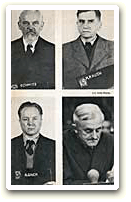
| Chapter Eleven The Crunch The experience of global war gave official school reform a grand taste for what was possible. Government intervention was proclaimed the antidote for all dissent. In every nook and cranny of American life new social organizations flourished, all feeding on intervention into personal sovereignty and family life. A new republic was here at last just as Herbert Croly announced, and government school was its church. |
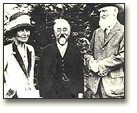
| Chapter Twelve Daughters Of The Barons of Runnemede The new compulsion-school institution was assigned the task of fixing the social order into place, albeit with the cautions of Pareto and Mosca kept in mind. Society was to reflect the needs of modern corporate organization and the requirements of rational evolution. The best breeding stock had to be protected and displayed. The supreme challenge was to specify who was who in the new hierarchical order.
|
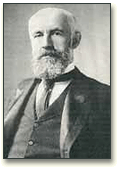
| Chapter Thirteen The Empty Child The basic hypothesis of utopia-building is that the structure of personhood can be broken and reformed again and again. The notion of empty children was the most important concept which inspired social architects and engineers to believe that schools could indeed be remade into socialization laboratories.
|
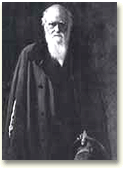
| Chapter Fourteen Absolute Absolution God was pitched out of forced schooling on his ear after WWII. This wasn’t because of any constitutional proscription—there was none that anyone had been able to find in over a century and a half—but because the political state and corporate economy considered the Western spiritual tradition too dangerous a competitor. And it is. |

| Chapter Fifteen The Psychopathology Of Everyday Schooling None of the familiar school sequences is defensible according to the rules of evidence, all are arbitrary; most grounded in superstition or aesthetic prejudice of one sort or another. Pestalozzi’s basic “Simple to Complex” formulation, for instance, is a prescription for disaster in the classroom. |
| PART FIVE The Problem Of Modern Schooling |
|

| Chapter Sixteen A Conspiracy Against Ourselves Spare yourself the anxiety of thinking of this school thing as a conspiracy, even though the project is indeed riddled with petty conspirators. It was and is a fully rational transaction in which all of us play a part. We trade the liberty of our kids and our free will for a secure social order and a very prosperous economy. It’s a bargain in which most of us agree to become as children ourselves, under the same tutelage which holds the young, in exchange for food, entertainment, and safety. The difficulty is that the contract fixes the goal of human life so low that students go mad trying to escape it. |
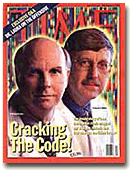
| Chapter Seventeen The Politics Of Schooling At the heart of the durability of mass schooling is a brilliantly designed power fragmentation system which distributes decision-making so widely among so many warring interests that large-scale change is impossible without a guidebook. Few insiders understand how to steer this ship and the few who do may have lost the will to control it.
|
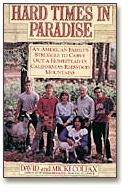
| Chapter Eighteen Breaking Out Of The Trap The only conceivable way to break out of this trap is to repudiate any further centralization of schooling in the form of national goals, national tests, national teaching licenses, school-to-work plans, and the rest of the utopian package which accompanies these. Schooling must be desystematized, the system must be put to death. Adam Smith has correctly instructed us for more than two centuries now that the wealth of nations is the product of freedom, not of tutelage. The connection between the corporate economy, national politics, and schooling is a disease of collectivism which must be broken if children are to become sovereign, creative adults, capable of lifting a free society to unimaginable heights. The rational manage- ment model has damaged the roots of a free society and the free market it claims to defend.
|
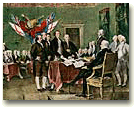
| Epilogue
What has happened in our schools was foreseen long ago by Jefferson. We have been recolonized silently in a second American Revolution. Time to take our script from this country’s revolutionary start, time to renew traditional hostility toward hierarchy and tutelage. We became a unique nation from the bottom up, that is the only way to rebuild a worthy concept of education. |
| About The Books I Used Index Acknowledgments About The Author |
|